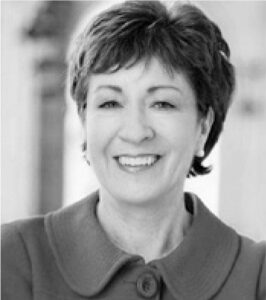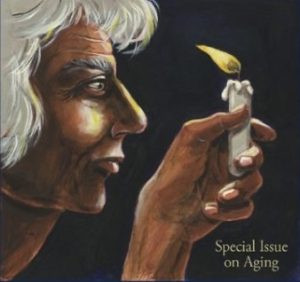Priorities of the U.S. Senate Aging Committee
by Susan M. Collins
As a senator representing the state with the oldest median age, I am particularly focused on the well-being of America’s seniors. It has been my privilege to serve on the Senate Aging Committee since my first days in the Senate and an honor to have been elected chairman for the 114th Congress.
The committee has three major priorities: investing in biomedical research targeting diseases that disproportionately affect older Americans, such as Alzheimer’s and diabetes; protecting seniors against financial exploitation and scams; and improving retirement security.
In my work as chairman of the Congressional Alzheimer’s Caucus, I have learned much about our nation’s most costly disease and the devastating effect it has on more than five million Americans and their families. Although promising research is underway, there currently are no means of prevention, effective treatments, or cure for Alzheimer’s disease. The good news is that the Senate Appropriations Committee, on which I serve, recently approved a 60 percent increase in Alzheimer’s research funding. I am delighted that the Senate is finally recognizing the need for a greater investment in Alzheimer’s research and will work for this funding to be retained in the final version of the appropriations for the National Institutes of Health.
A national plan to combat Alzheimer’s and other debilitating conditions must include assistance for the family caregivers on the front lines. The bipartisan RAISE Family Caregivers Act that I have introduced would help us to leverage our resources, promote innovation and promising practices, and provide our nation’s family caregivers with much-needed recognition and support.
Investments in biomedical research not only improve the health and longevity of Americans, but also provide ongoing benefits to our economy and the federal budget. For example, nearly one of three Medicare dollars is spent treating people with diabetes, and the incidence and costs of that disease are projected to go up as our populationages. Advancements in the prevention and treatment of diabetes can save lives and help extend the solvency of Medicare. Since I founded the Senate Diabetes Caucus in 1997, funding for diabetes research has more than tripled from $319 million to well over a billion dollars this year. As a consequence, we have seen some encouraging breakthroughs and are on the threshold of a number of new discoveries.
The Aging Committee has taken an aggressive approach to fighting fraudand schemes targeting our nation’s seniors. Financial exploitation of olderAmericans is a growing epidemic that cost seniors an estimated $2.9 billion in 2010. It is very troubling that in as many as 90 percent of these cases, the senior is victimized by someone he or she knows well. Financial abuse of seniors can jeopardize their physical and emotional well-being as well as their financial security.
Maine is on the cutting edge of helping to combat financial abuse through a program called “Senior$afe,” which is a collaborative effort by Maine, regulators of financial institutions, and legal organizations to help educate bank and credit union employees about how to identify and help stop financial exploitation. Based on that model, I am exploring possible federal legislation to encourage banks and credit unions to train their employees to spot the signs that a senior may have fallen victim to fraud.
In addition, the Aging Committee has established a toll-free fraud hotline at (1-855-303-9470). Increased calls to our hotline this spring enabled us to issue an advisory that warned seniors of phony IRS agents demanding payment for back taxes and penalties that were not owed.
As for retirement security, one in four retirees has no source of income beyond Social Security. Nearly six in ten Americans are worried whether they will be able to maintain their standard of living in retirement, and for good reason. There is an estimated $7.7 trillion gap between the savings American households need to maintain their standard of living and what they have actually saved.
There are many reasons for the decline in retirement security facing American seniors, including the demise of many defined-benefit pensions in the private sector, the severity of the recent financial crisis, rising health care costs, the need for long-term care, and most of all, the fact that Americans are living far longer than they did in the past. Many Americans reaching retirement age also have more debt than retirees of previous generations. These are all issues that the Aging Committee is exploring in depth.
Maine’s demographics present a challenge, but also an opportunity. The role played by America’s small businesses in creating jobs and economic growth is well known, but the role played by America’s seniors may come as a surprise. Individuals between the ages of 55 and 64 make up the largest percentage of new business owners in the United States. In the realm of human capital, these encore entrepreneurs can be a significant asset.
Seniors often have advantages that make them excellent entrepreneurs. These include their life experience and real-world education and the networks they have established and maintained throughout their careers. I am committed to helping ensure that our senior entrepreneurs have the resources and support that will help them succeed.
Last year, our committee joined with the Small Business and Entrepreneurship Committee to explore this issue. At our hearing, I shared some stories of the many successful encore entrepreneurs in Maine. Whether they turned hobbies into thriving businesses or applied their work experience to new enterprises, they provide financial security for themselves and rewarding jobs for their employees.
This June, I invited Maine entrepreneur Susan Nordman to testify at an Aging Committee hearing on work after retirement. She told the committee that the success of her artisan handbag company, Erda, in Dexter, is due in large part to the experience, work ethic, and appreciation for Maine’s manufacturing heritage among her senior employees, who need to work and who also want to stay active, physically and mentally.
Since its inception in 1961, the Aging Committee has spurred Congress to action on issues important to older Americans through its hearings, investigations, and reports, and it has a long tradition of bipartisanship. As the baby boom generation becomes a silver tsunami of retirees, this work will be ever more important, and I am grateful to be part of it.

Susan M. Collins has represented Maine in the U.S. Senate since 1996. She has earned a national reputation as an effective legislator who works across party lines to seek consensus on important national issues. Sen. Collins chairs the Senate Select Committee on Aging and serves on the Appropriations and Intelligence Committees, as well as the Committee on Health, Education, Labor and Pensions. Known for her Maine work ethic, Sen. Collins has never missed a vote in her years in office—more than 6,000 votes in a row.
Citation: Collins, Susan M. . “Margaret Chase Smith Essay: Priorities of the U.S. Senate Aging Committee.” Maine Policy Review 24.2 (2015) : 8 -9, https://digitalcommons.library.umaine.edu/mpr/vol24/iss2/3.

